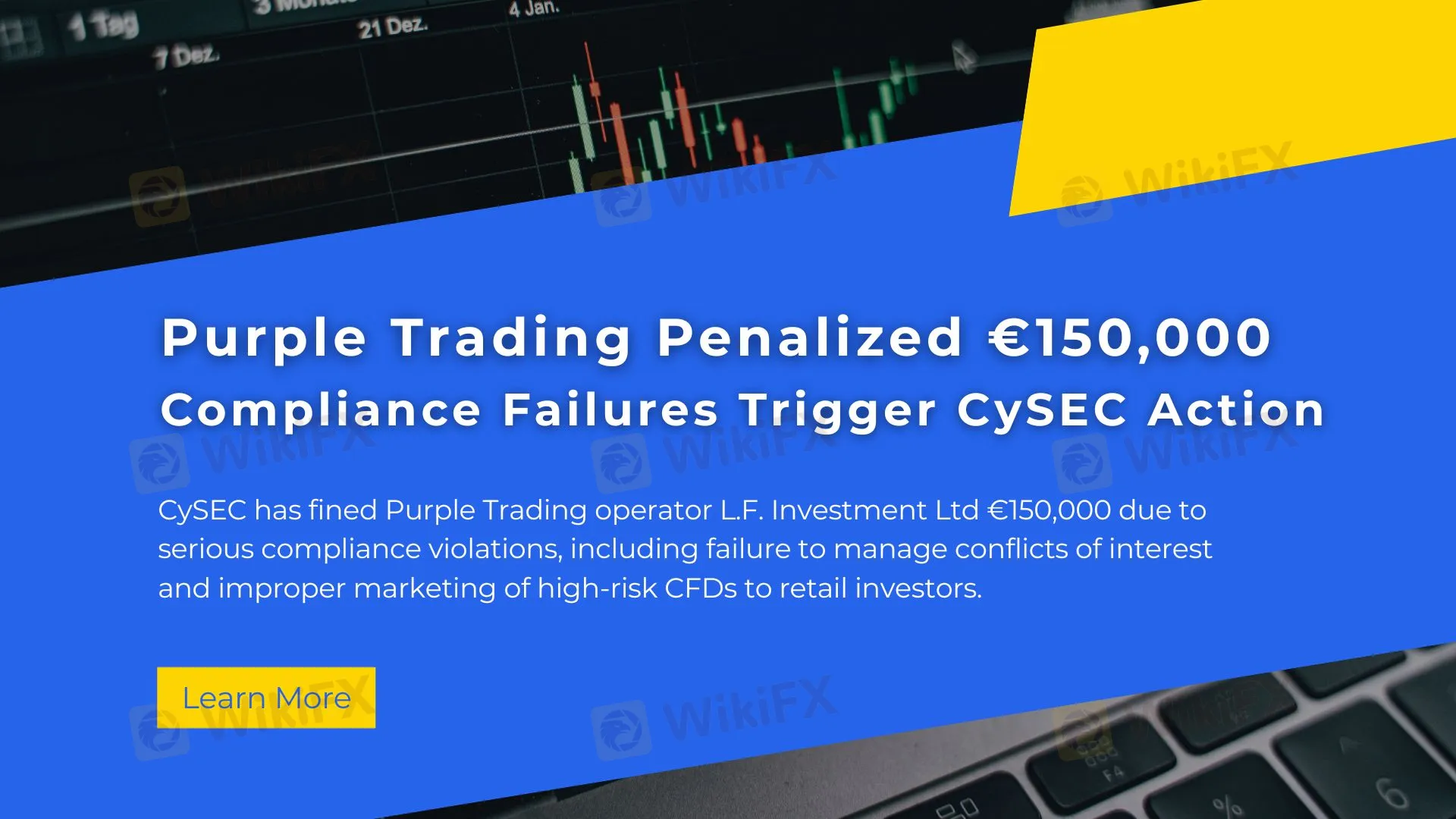简体中文
繁體中文
English
Pусский
日本語
ภาษาไทย
Tiếng Việt
Bahasa Indonesia
Español
हिन्दी
Filippiiniläinen
Français
Deutsch
Português
Türkçe
한국어
العربية
Purple Trading Penalized €150,000 Over Compliance Failures in Cyprus
Abstract:CySEC has fined Purple Trading operator L.F. Investment Ltd €150,000 for compliance failures related to conflicts of interest and the marketing of high-risk CFDs to retail investors.

L.F. Investment Ltd, the company behind Purple Trading, has agreed to pay a €150,000 settlement to Cypruss financial regulator, CySEC, following a series of compliance lapses identified during a multi-year investigation. The fine stems from failures related to conflict-of-interest management, client communication practices, and the marketing of high-risk CFD products to retail investors.
The investigation, covering the period from July 2021 to October 2023, highlighted concerns over how Purple Trading operated under Cyprus Investment Firm (CIF) regulations. CySEC flagged shortcomings in the companys internal controls, its approach to disclosing information to clients, and how it appointed and oversaw tied agents.
A particular point of concern was the brokers handling of CFDs. Despite strict European rules limiting the marketing of such risky products to retail clients, CySEC found that Purple Trading may have breached those restrictions, raising investor protection issues.
Although the settlement allows the company to avoid a lengthy enforcement process, the case reflects the increased scrutiny regulators are placing on firms that deal in leveraged products. CySEC emphasized that while the fine was paid directly to the state treasury and not retained by the regulator, the outcome reinforces the need for firms to uphold high compliance standards.
This latest enforcement action comes as part of a broader trend of regulatory tightening across Europe, with CySEC stepping up efforts to enforce investor safeguards and maintain trust in the retail trading sector. For traders, the case serves as a reminder to choose brokers with strong compliance records—and to be cautious with firms promoting complex financial products.
Disclaimer:
The views in this article only represent the author's personal views, and do not constitute investment advice on this platform. This platform does not guarantee the accuracy, completeness and timeliness of the information in the article, and will not be liable for any loss caused by the use of or reliance on the information in the article.
Read more

Inside the World of Prop Trading | What You Need to Know
In recent years, proprietary trading firms (commonly referred to as “prop trading” firm) have gained significant traction in financial markets. These companies operate on a model that sees traders using the firm's own capital to engage in market speculation, allowing individuals to participate in trading without risking their personal funds. In return, profits generated are typically shared between the trader and the firm under a pre-agreed structure.

New Era of Funded Trading? Top Prop Firms to Know in 2025!
In 2025, more traders are showing interest in proprietary trading. This approach might be a way to trade with large amounts of capital without putting personal savings at risk. As the industry grows, choosing the right prop trading firm could be more important than ever.

Fintech Firm EBSWare Expands Prop Trading to Global Stocks
Global fintech innovator EBSWare has recently broadened its EBSWare Prop white-label solution, enabling brokers to incorporate global stock markets into their proprietary trading platforms. This strategic expansion targets the growing demand for stock-based prop trading by offering a versatile and robust framework for trading challenges and competitions.

Oanda Shines As Frop Trading Firm After Being Acquired By FTMO
FTMO enhances prop trading with the OANDA Prop Trader Community and loyalty program, integrating CRM automation and rewards post-acquisition.
WikiFX Broker
Latest News
Consob Blocks 7 Fraudulent Investment Websites Amid Ongoing Crackdown
MyFundedFutures Tightens Compliance Measures Following Regulatory Pressure
Investors Beware! The Pound May Face a Downturn in the Second Half of the Year
Stock futures rise after Trump says Iran-Israel ceasefire is in effect: Live updates
UK vows to spend 5% of GDP on national security by 2035
NATO wants allies to spend 5% of GDP on defense: This chart shows how hard it could be
Can Germany afford a 5% NATO defense spending target?
Gold Prices Down in Early Hours of Spot Trading Today in India
Purple Trading Penalized €150,000 Over Compliance Failures in Cyprus
Tiger Brokers Expands Hong Kong Operations to Tap Offshore Chinese Wealth
Currency Calculator


